Joshua M. Bauml, MD, Perelman School of Medicine
Articles by Joshua M. Bauml, MD, Perelman School of Medicine
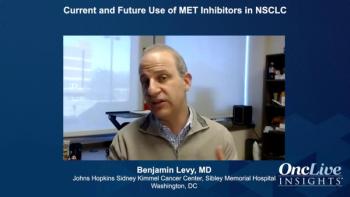
Healthcare professionals who manage patients with non–small cell lung cancer comment on their current experience using MET inhibitors as treatment for patients who harbor MET exon 14 skipping mutations and highlight strategies under investigation that will hopefully address current gaps in therapy.
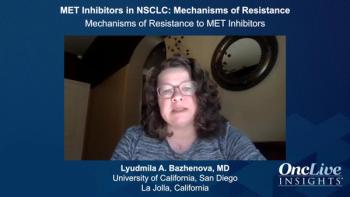
The rationale for using MET inhibitors as first-line therapy for patients with non–small cell lung cancer who harbor MET exon 14 skipping mutations and considerations for sequencing later lines of therapy based on what is known to date about mechanisms of resistance to MET inhibitors.
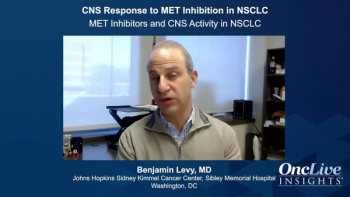
The significance of using MET inhibitors to manage patients who have MET exon 14 skipping mutations in non–small cell lung cancer with CNS (central nervous system) involvement.
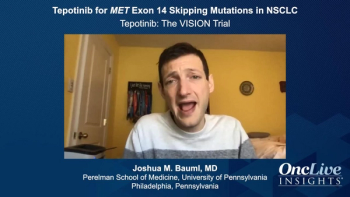
Implications for treating patients with non–small cell lung cancer who harbor MET exon 14 skipping mutations with tepotinib, a MET inhibitor, based on data revealed by the VISION trial.
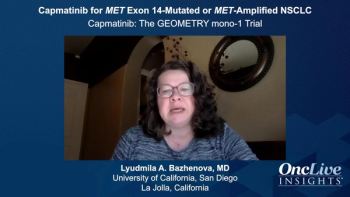
Discussion on the FDA approval of capmatinib, a MET inhibitor, as treatment for patients with MET exon 14-mutated non–small cell lung cancer based on data demonstrated by the GEOMETRY mono-1 study.
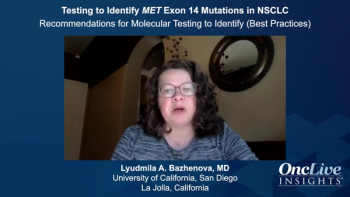
Recommendations for using next-generations sequencing panels as well as liquid biopsies to help identify MET exon 14 skipping mutations and other oncogenic drivers in patients with non–small cell lung cancer.

Updates on I/O Therapy for Non-Driver mNSCLC
ByJoshua M. Bauml, MD, Perelman School of Medicine,Hossein Borghaei, DO, MS, Fox Chase Center at Temple Health,Balazs Halmos, MD, MS, Montefiore Einstein Center for Cancer Care,Jarushka Naidoo, MBBCh, Sidney Kimmel Cancer Center, Johns Hopkins 
EGFR Exon 20 Mutations in NSCLC
ByJoshua M. Bauml, MD, Perelman School of Medicine,Hossein Borghaei, DO, MS, Fox Chase Center at Temple Health,Balazs Halmos, MD, MS, Montefiore Einstein Center for Cancer Care,Jarushka Naidoo, MBBCh, Sidney Kimmel Cancer Center, Johns Hopkins 
KRAS-Mutant NSCLC
ByJoshua M. Bauml, MD, Perelman School of Medicine,Hossein Borghaei, DO, MS, Fox Chase Center at Temple Health,Balazs Halmos, MD, MS, Montefiore Einstein Center for Cancer Care,Jarushka Naidoo, MBBCh, Sidney Kimmel Cancer Center, Johns Hopkins 
HER2 Targeted Therapy for Treatment of NSCLC
ByJoshua M. Bauml, MD, Perelman School of Medicine,Hossein Borghaei, DO, MS, Fox Chase Center at Temple Health,Balazs Halmos, MD, MS, Montefiore Einstein Center for Cancer Care,Jarushka Naidoo, MBBCh, Sidney Kimmel Cancer Center, Johns Hopkins 
MET Exon 14 Mutations in mNSCLC
ByJoshua M. Bauml, MD, Perelman School of Medicine,Hossein Borghaei, DO, MS, Fox Chase Center at Temple Health,Balazs Halmos, MD, MS, Montefiore Einstein Center for Cancer Care,Jarushka Naidoo, MBBCh, Sidney Kimmel Cancer Center, Johns Hopkins 
RET Fusion+ mNSCLC
ByJoshua M. Bauml, MD, Perelman School of Medicine,Hossein Borghaei, DO, MS, Fox Chase Center at Temple Health,Balazs Halmos, MD, MS, Montefiore Einstein Center for Cancer Care,Jarushka Naidoo, MBBCh, Sidney Kimmel Cancer Center, Johns Hopkins 

Joshua M. Bauml, MD, assistant professor of Medicine, Hospital of the University of Pennsylvania and the Veteran's Administration Medical Center, discusses the differences between pembrolizumab (Keytruda) and cytotoxic chemotherapies.

Joshua M. Bauml, MD, assistant professor of Medicine, Hospital of the University of Pennsylvania and the Veteran's Administration Medical Center, discusses the preliminary results of the KEYNOTE-055 study, which investigated pembrolizumab (Keytruda) after failure on platinum-based therapy and cetuximab in patients with head and neck squamous cell carcinoma.

Joshua M. Bauml, MD, assistant professor, University of Pennsylvania, discusses a novel IT platform designed to enhance lung cancer clinical trial enrollment.























